Charity shops: Sex toys and ashes among more bizarre donations
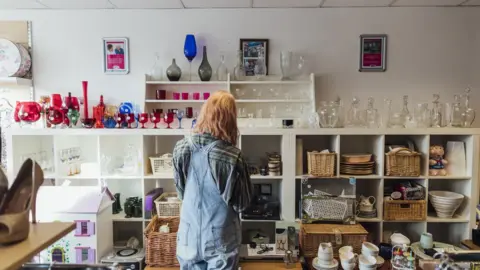 Getty Images
Getty ImagesUsed sex toys, taxidermy pets, someone's ashes and a teapot full of mouldy tea - these are just some of the bizarre donations charity shops say they have received.
With the annual January declutter in full swing following Christmas' influx of toys and general detritus, many households may be thinking of donating to their local charity shop.
So what donations are charity shops hoping for?
And what items could they live without?
Stacey Dyer, who works in the Ty Hafan shop in Aberdare, Rhondda Cynon Taf, says staff have become accustomed to "wacky and crazy donations".
"We've had a prosthetic leg donated with a shoe still attached to it," she said.
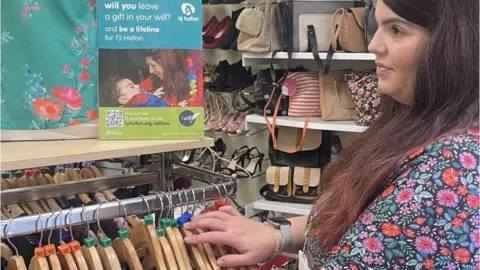 Stacey Dyer
Stacey DyerShe said recently a woman donated her son's jeans without realising he was keeping his Christmas savings in the back pocket.
"She phoned up up frantic… we had to go through all the donations and luckily we did find it," she said.
At Halloween the shop was donated a very realistic severed hand.
"It was very scary because when it came out the bag we were like 'is this actually a hand?' but it was just very, very authentic looking," she said.
"False teeth is a common one," said Maggie Hamilton, a retail area manager for Tenovus Cancer Care, which covers south Wales.
"We recently received a teapot with the tea in it and the water, and you kind of think 'how did you do that? Did you just take it off the side of the kitchen and just bring it in?'
"It managed to come to us all the way with the tea bags and the water still in it, but it wasn't fresh, it was quite mouldy."
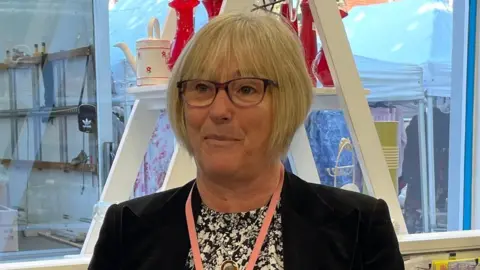 Hope House
Hope HouseAngela Whelan is head of retail for Hope House Children's Hospices which support seriously ill children in Shropshire, Cheshire, Powys and north Wales.
She said a few years ago their Chester shop was donated a saddle for a camel.
"That was really amazing and sold very quickly actually, so we were really surprised about that one," she said.
They recently received some Ferrari parts which sold very well on the charity's eBay site.
Patrick Jackson, a regional manager for British Red Cross, said: "We unfortunately have used sex toys that have been donated.
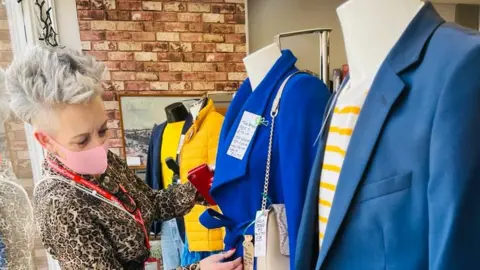 British Red Cross
British Red Cross"We've had stuffed family pets that have been donated, people's ashes, false teeth… black bin bags of household waste that has somehow accidentally been donated to us."
Patrick, who looks after the charity's shops in south east Wales and along the M4 corridor up to Oxfordshire, said some of the donations leave him baffled.
"I don't know if it's people accidentally donating things or not paying attention or they're doing it for a laugh," he said.
"It certainly sparks a bit of a conversation with everyone in our stock rooms, people have a laugh and a giggle, but we've got to be mindful that it's got to be a safe environment for our teams to work in."
He said they had also been donated some incredibly generous high-value items.
"We've had people donate a yacht to the charity," he said.
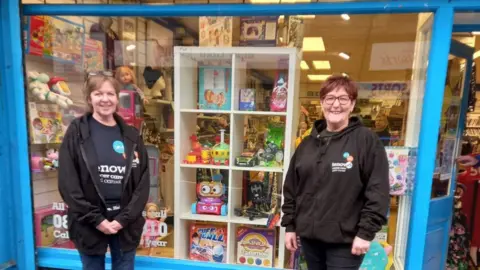 Maggie Hamilton
Maggie HamiltonMaggie said the Tenovus shop in Tonypandy, Rhondda Cynon Taf, had recently received rugby shirts signed by the players from the Barbarians vs New Zealand game in 1973 where Gareth Edwards is widely considered to have scored one of the greatest tries ever.
Another "hugely generous" item donated to its Cardiff shop last year was a special edition of James Joyce's Ulysses which fetched £750 at auction.
So what donations are charity shops looking for?
"We're grateful for any donations but clothing is our big seller," said Stacey,
She is hoping people will consider donating any unwanted Christmas presents,.
Angela said Hope House loved receiving donations of "fashion for all the family", as well as accessories, jewellery, homeware, kitchen accessories and unwanted gifts such as toiletries.
"If you're thinking 'yes, I would buy this' it should be a donation because that means that we can definitely sell it," she said.
Maggie said since the Covid pandemic the growth areas for her shops were women's and men's clothing, books and toys.
"More people are willing to come to charity shops because they believe in sustainable fashion and want to buy second hand," she said.
But she said they were willing to take "anything and everything - stamps, coins, clothing, books, pictures - it's all very welcome".
So what items would charity shops prefer you left at home?
Maggie said not all of Tenovus's shops were able to take electrical items but those that could were listed on their website.
They also cannot sell candles or bedding without a safety label.
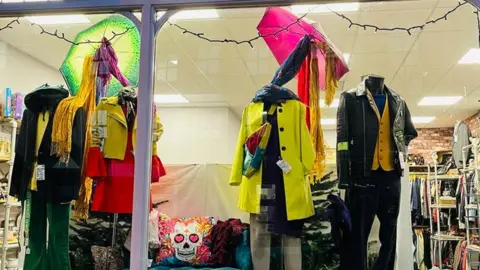 British Red Cross
British Red Cross"If something's broken or dirty then people won't buy it," she said.
Angela said before making a donation people should consider if the item is still useable.
"With games if you've got pieces missing it becomes unusable and therefore no good to sell on to our customers," she said.
"We're really looking for that donation that's got that second life to give to somebody else."
Stacey said receiving soiled, damaged or broken items could be "quite disheartening".
"It costs Ty Hafan tens of thousands of pounds every year trying to get rid of waste that people donate and people might not think that when they donate it to us," she said.
"If it's broken or chipped china and things like that we have to pay to get it disposed of and taken into landfill, so that that's a massive cost, an ever increasing cost for the sector," explained Patrick.
He said another bugbear was people leaving donations outside shops when the shop was closed, something he said had worsened since many recycling centres had become appointment only.
"A lot of people dump bags and bags [of stuff] outside our doorstep overnight and that's quite a shame, because the rain gets to it, sometimes seagulls or animals will rip open the bags, and when our teams come to the shop first thing in the morning they've got a pile of bags that have been split open and halfway down the street that we've got to clear up first," he said.
"If it's wet we can't even sell it and it's not fit for recycling either."
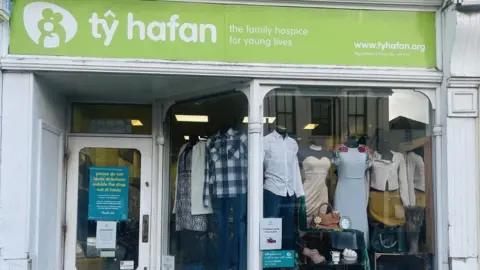 Stacey Dyer
Stacey DyerHe said people donating items should always come into charity shops during trading hours so they have an opportunity to register for gift aid, meaning the charity receives an extra 25p for every pound they make on items donated by UK tax payers.
Angela fears the cost-of-living crisis could deter some people from donating.
"Normally [January] is a good time of year for donations but this year we're sort of worrying about circumstances for everybody… what they can and can't afford to do," she said.
She said some people may choose to sell their unwanted items online rather than donating.
Patrick said the cost-of-living crisis also meant some people who may have otherwise considered volunteering to work in a charity shop were choosing to take paid shop work instead, with the sector as a whole was down 30% in volunteering hours.
Patrick, Maggie, Angela and Stacey all said overall the public were incredibly generous.
Donations not only raise money for charity but also helped cash-strapped shoppers and save items from going to landfill, helping the planet, said Stacey.
She said: "You should feel really proud about donating your items, we are so grateful."
